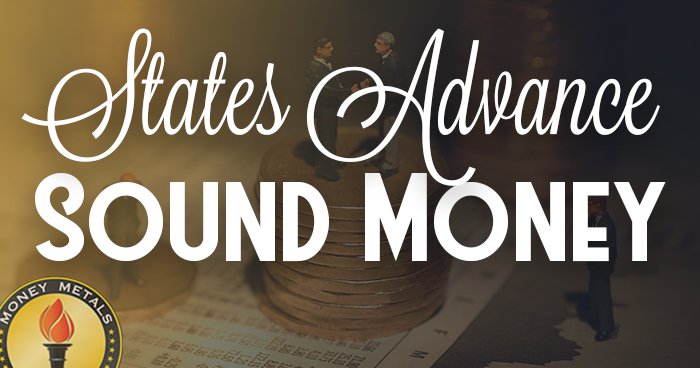Listen to the Podcast Audio: Click Here

Precious metals markets can certainly be volatile from week to week, but over time they are a more reliable store of value than Federal Reserve Notes. Gold and silver remain the world’s most enduring and most widely recognized form of money. And, as spelled out in the U.S. Constitution, gold and silver coins are legal tender. Individual states thus can formally recognize gold and silver coins as legal tender alternatives to Federal Reserve Note dollars.
Both Utah and Oklahoma have passed legal tender laws in recent years recognizing gold and silver as money. The metals can be used freely as a means of payment and are free from all state taxes. More than 20 states have already removed sales taxes from precious metals transactions, with Alabama, Tennessee, and Maine now considering their own proposals to do so as well.
Other states, including Arizona and Idaho, are moving forward on legislation to exempt silver and gold bullion from capital gains taxes. Since Money Metals Exchange is located in Idaho, we would be particularly excited to see it become a haven for sound money.
Last Thursday a bill to eliminate capital gains taxes on precious metals passed the Idaho House Committee on Revenue and Taxation. Money Metals President Stefan Gleason testified before the Committee. Here is some of what he had to say:
Stefan Gleason: Our mission is to educate people also about precious metals and help them diversify into this reliable and more stable form of money, really truly a Constitutional money with tremendous history going back to the founding of our country. Gold and silver have been chosen for thousands of years as money because of their qualities as financial insurance, as a store of value, and its practicality as a medium of exchange. The bill I want to talk about today is a straightforward bill. Basically, we don’t want to tax money in Idaho. Idaho already does not tax precious metals with its sales tax, and we’re asking for it to be removed from the calculation of income tax in Idaho.
The Founders of our nation dealt with the collapse of the un-backed continental dollar, and that was fresh in their minds when they created our monetary system and established gold and silver as our nation’s money. In fact, the dollar was defined as a fixed amount of silver, and even in the Constitution the Founders restricted states from making payment in anything other than gold and silver coins for payment of debt. For the first hundred years, our nation’s money gold and silver coinage maintained its purchasing power pretty much consistently, except for a small period of time during the Civil War when we went off the gold standard.
But then about 100 years ago the Federal Reserve was created, and since that time we’ve seen a dramatic decline in the purchasing power of what is now considered the dollar but really is called the Federal Reserve Note. Of course, the last link to gold was severed officially in 1971, and that has led to an acceleration of this devaluation in purchasing power and an explosion in federal government debt during that same period of time.
The people that are most harmed by inflation are wage earners and savers. When the dollar goes down in purchasing power, they lose. Fortunately, an increasing number of citizens are recognizing that owning gold and silver as an alternative form of savings is a good way of protecting some of their wealth, protecting some of their purchasing power, and standing against this ongoing devaluation. It’s also something that helps in periods of financial turmoil, which seem to be increasing under our current system. Gold and silver are a safe haven.













Leave A Comment